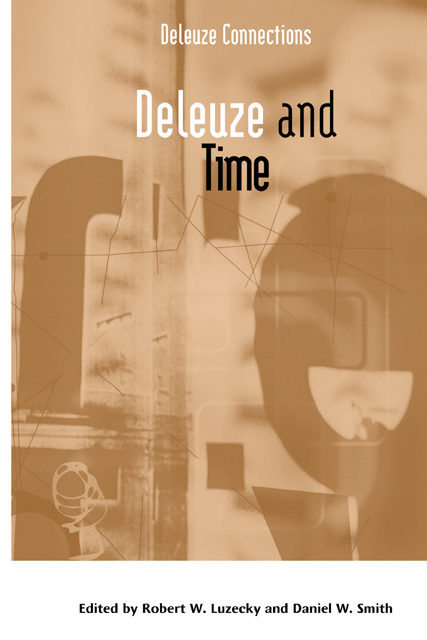5 - Time and the Untimely: Deleuze, Foucault and the Production of the New
Published online by Cambridge University Press: 13 April 2023
Summary
Untimely – that is to say, acting counter to our time and thereby acting on our time and, let us hope, for the benefit of a time to come (Nietzsche 1997: 60)
Time is the most radical form of change, but the form of change does not change. (Deleuze 1994: 89)
Once defined, a form is simultaneously too old and too new, too strange and too familiar, not to be instantly rejected … (Foucault 1998: 167)
Introduction: Time and History
The relationship between Gilles Deleuze and Michel Foucault was, if not untimely, then at least out of joint. Both thinkers acted counter to their time. Deleuze was an empiricist and a metaphysician in the time of phenomenology and structuralism. Foucault frequently shifted shape as he strove to develop a method for diagnosing the present. Deleuze and Foucault seemed to dance around each other on the margins of the intellectual stage that was France in the 1960s, ‘70s and ‘80s, coming closer to the centre as their disruptions came, perhaps inevitably, to define an age. Nietzsche deeply influenced both thinkers, but their respective uses of Nietzsche led them down quite distinct intellectual paths. Likewise, both frequently engaged the literary avant-garde, but Deleuze became a champion of Anglo-American literature while Foucault’s tastes skewed continental. Both found fault with the dominant trends in psychology and medicine, which led Deleuze (and Guattari) to develop schizoanalysis, and Foucault into studies of madness, hermaphrodism and sexuality. Foucault rejected the term desire, while Deleuze made it a central concept of his philosophy. At the same time, Deleuze criticised Foucault’s attempts to rehabilitate the notions of pleasure and truth. Their magnetic dance of attraction/repulsion led to a genuine friendship between the two, although collaboration between them was scant, and as their careers progressed their friendship cooled. Deleuze frequently wrote about and through other philosophers, but he wrote Foucault only after Foucault’s untimely death in 1984. Foucault contributed a flattering preface to Deleuze and Guattari’s Anti-Oedipus: Capitalism and Schizophrenia 1. The two collaborated in the Groupe d’Information sur les Prisons in the early 1970s, and they commented on one another from time to time in interviews and articles. Yet these encounters did not much lessen the gap between them.
- Type
- Chapter
- Information
- Deleuze and Time , pp. 98 - 115Publisher: Edinburgh University PressFirst published in: 2023

